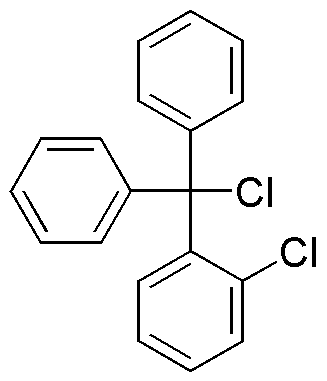2-Chlorotrityl chloride is widely utilized in research focused on:
- Solid-Phase Synthesis: This compound serves as a key reagent in solid-phase peptide synthesis, allowing researchers to create complex peptides efficiently. Its ability to form stable linkages makes it ideal for generating diverse peptide libraries.
- Drug Development: In medicinal chemistry, it is used for the synthesis of various pharmaceutical compounds. Its reactivity enables the introduction of functional groups that can enhance the biological activity of drug candidates.
- Polymer Chemistry: It plays a crucial role in the development of polymeric materials. By acting as a chlorinated initiator, it helps in the formation of polymers with specific properties, useful in coatings and adhesives.
- Organic Synthesis: This compound is valuable in organic synthesis for the preparation of chlorinated intermediates. Its unique structure allows for selective reactions that are beneficial in creating complex organic molecules.
- Analytical Chemistry: It is utilized in the development of analytical methods, particularly in chromatography. Its properties help in improving the resolution and sensitivity of various analytical techniques.
General Information
Properties
Safety and Regulations
Applications
2-Chlorotrityl chloride is widely utilized in research focused on:
- Solid-Phase Synthesis: This compound serves as a key reagent in solid-phase peptide synthesis, allowing researchers to create complex peptides efficiently. Its ability to form stable linkages makes it ideal for generating diverse peptide libraries.
- Drug Development: In medicinal chemistry, it is used for the synthesis of various pharmaceutical compounds. Its reactivity enables the introduction of functional groups that can enhance the biological activity of drug candidates.
- Polymer Chemistry: It plays a crucial role in the development of polymeric materials. By acting as a chlorinated initiator, it helps in the formation of polymers with specific properties, useful in coatings and adhesives.
- Organic Synthesis: This compound is valuable in organic synthesis for the preparation of chlorinated intermediates. Its unique structure allows for selective reactions that are beneficial in creating complex organic molecules.
- Analytical Chemistry: It is utilized in the development of analytical methods, particularly in chromatography. Its properties help in improving the resolution and sensitivity of various analytical techniques.
Documents
Safety Data Sheets (SDS)
The SDS provides comprehensive safety information on handling, storage, and disposal of the product.
Product Specification (PS)
The PS provides a comprehensive breakdown of the product’s properties, including chemical composition, physical state, purity, and storage requirements. It also details acceptable quality ranges and the product's intended applications.
Certificates of Analysis (COA)
Search for Certificates of Analysis (COA) by entering the products Lot Number. Lot and Batch Numbers can be found on a product’s label following the words ‘Lot’ or ‘Batch’.
*Catalog Number
*Lot Number
Certificates Of Origin (COO)
This COO confirms the country where the product was manufactured, and also details the materials and components used in it and whether it is derived from natural, synthetic, or other specific sources. This certificate may be required for customs, trade, and regulatory compliance.
*Catalog Number
*Lot Number
Safety Data Sheets (SDS)
The SDS provides comprehensive safety information on handling, storage, and disposal of the product.
DownloadProduct Specification (PS)
The PS provides a comprehensive breakdown of the product’s properties, including chemical composition, physical state, purity, and storage requirements. It also details acceptable quality ranges and the product's intended applications.
DownloadCertificates of Analysis (COA)
Search for Certificates of Analysis (COA) by entering the products Lot Number. Lot and Batch Numbers can be found on a product’s label following the words ‘Lot’ or ‘Batch’.
*Catalog Number
*Lot Number
Certificates Of Origin (COO)
This COO confirms the country where the product was manufactured, and also details the materials and components used in it and whether it is derived from natural, synthetic, or other specific sources. This certificate may be required for customs, trade, and regulatory compliance.


